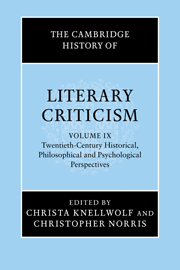Book contents
- Frontmatter
- Introduction
- HISTORY
- MARXISM AND POST-MARXISM
- FROM CULTURAL POETICS TO CULTURAL STUDIES
- PSYCHOANALYTIC APPROACHES
- GENDER AND SEXUALITY
- COLONIALISM, POST-COLONIALITY, NATION AND RACE
- MODERNITY AND POSTMODERNISM
- PHILOSOPHY, AESTHETICS AND LITERARY CRITICISM
- INTERDISCIPLINARY APPROACHES
- 29 Literature and theology
- 30 Literary theory, science and philosophy of science
- Bibliography
- Index
- References
30 - Literary theory, science and philosophy of science
from INTERDISCIPLINARY APPROACHES
Published online by Cambridge University Press: 28 March 2008
- Frontmatter
- Introduction
- HISTORY
- MARXISM AND POST-MARXISM
- FROM CULTURAL POETICS TO CULTURAL STUDIES
- PSYCHOANALYTIC APPROACHES
- GENDER AND SEXUALITY
- COLONIALISM, POST-COLONIALITY, NATION AND RACE
- MODERNITY AND POSTMODERNISM
- PHILOSOPHY, AESTHETICS AND LITERARY CRITICISM
- INTERDISCIPLINARY APPROACHES
- 29 Literature and theology
- 30 Literary theory, science and philosophy of science
- Bibliography
- Index
- References
Summary
Literary criticism and philosophy of science might appear to have few interests in common. After all, the main concern of philosophy of science – at least on one fairly standard conception – is to offer a justificatory account of how scientific theories achieve progress by providing an ever more detailed descriptive and depth-explanatory knowledge of physical objects, processes and events. Ideas may differ as to just how this should be done, whether (for example) through a ‘top-down’ method which seeks to derive empirical predictions from high-level covering-law statements or – conversely – through a ‘bottom-up’ inductive approach which starts out from the empirical data and treats them as the basis for constructing theories of the widest generality and scope. There are many other fundamental issues on which philosophers of science divide, among them the question (first raised by Hume) as regards the validity of inductive arguments in whatever form and the problem of justifying causal explanations (or appeals to putative ‘laws of nature’) which necessarily transcend the limits of observed regularity or Humean ‘constant conjunction’. So philosophy of science is far from presenting a united front in these matters. All the same it may be thought that such issues are worlds apart from the kinds of concern that typically preoccupy literary critics and theorists. For them, what counts is not so much a theory's truth or explanatory power but rather its capacity to capture certain salient aspects of our subjective reponse to literary works, or perhaps – in formalist terms – its ability to locate certain salient attributes of poetic or narrative structure. Such approaches may be thought to give criticism a more ‘scientific’ status, that is, a claim to utilise methods which emulate those of the physical sciences rather than appealing to the vagaries of mere individual reader-response. But there is still a fairly obvious sense in which literary theory – unlike philosophy of science – has to do with matters of cultural-linguistic or interpretative understanding where such scientific models would seem to have limited applicability
- Type
- Chapter
- Information
- The Cambridge History of Literary Criticism , pp. 401 - 418Publisher: Cambridge University PressPrint publication year: 2001
References
- 1
- Cited by

